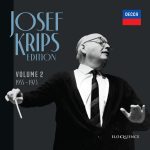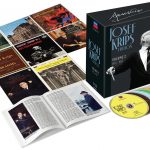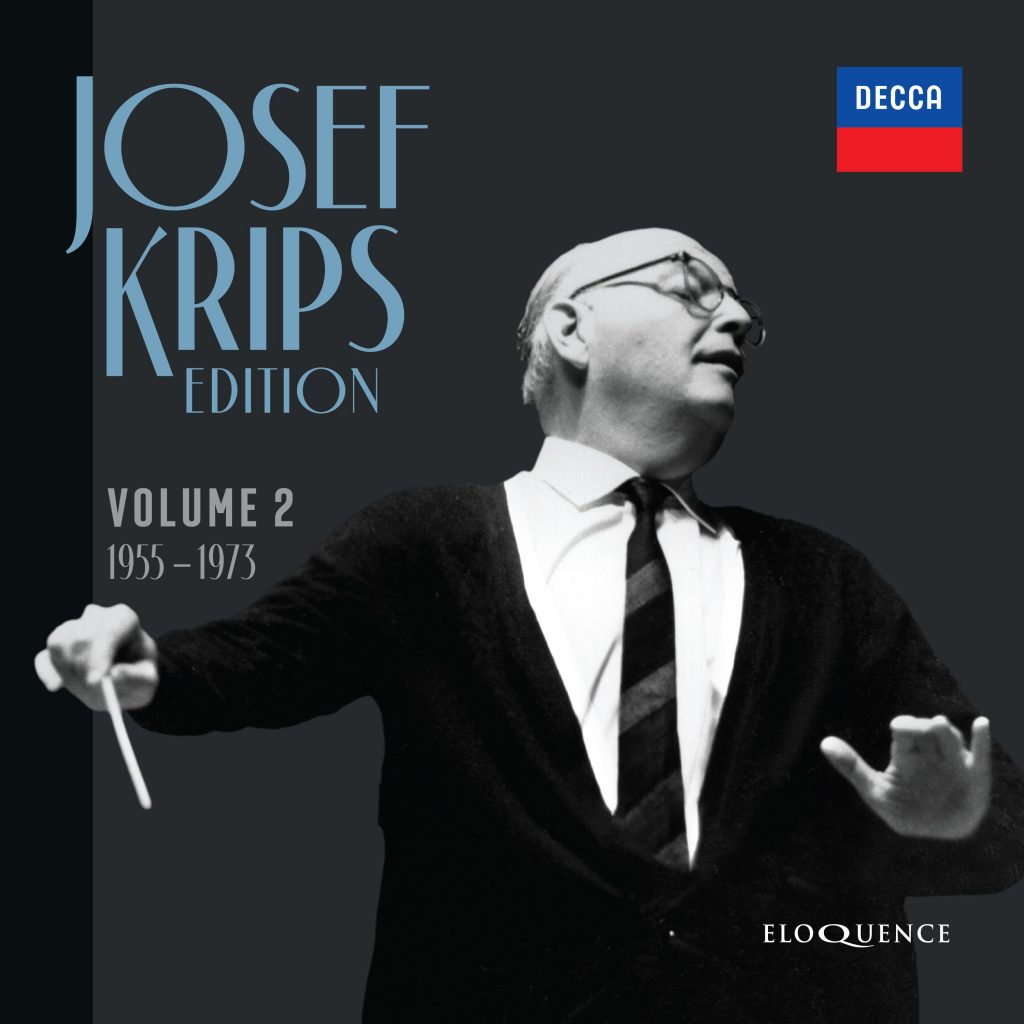
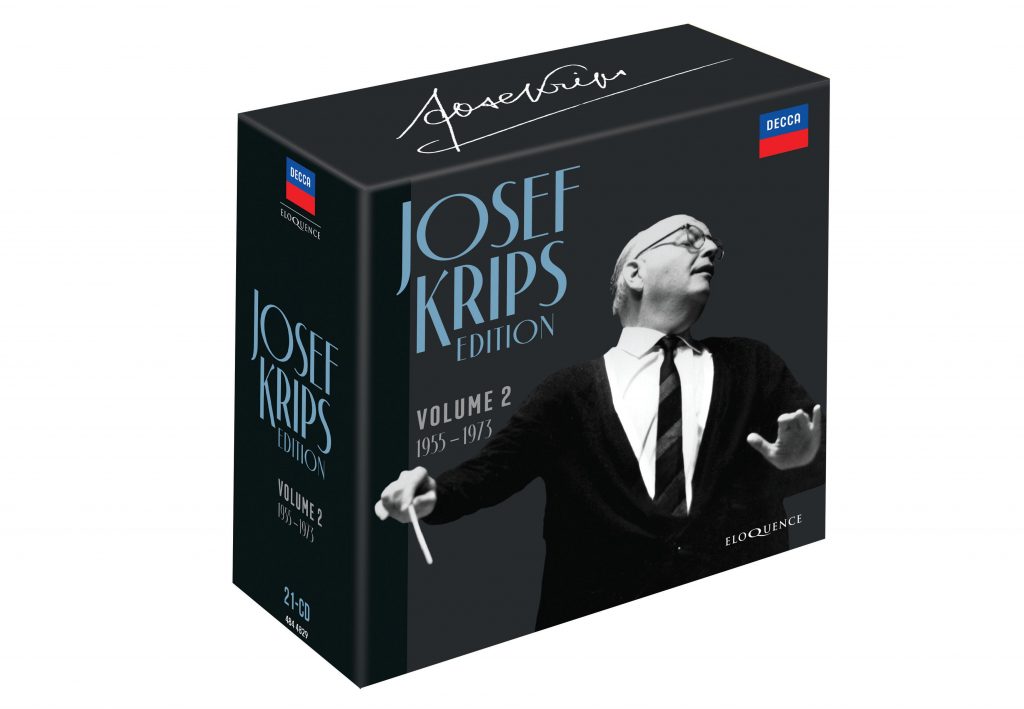
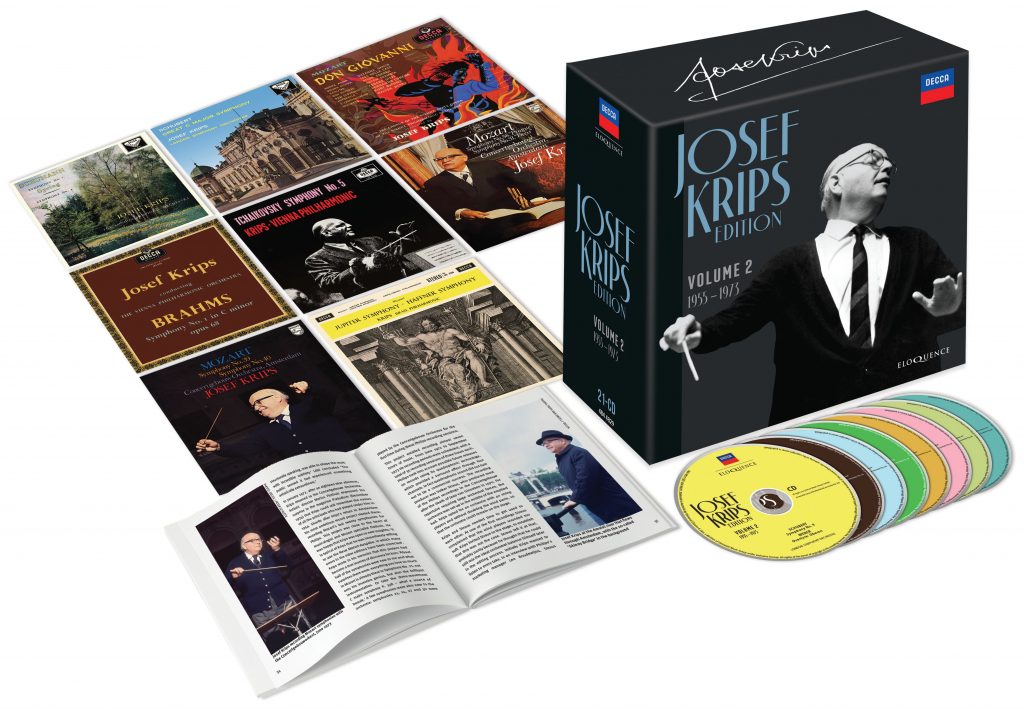
LIMITED EDITION.
By the time stereo technology had become standard in the mid-1950s, Josef Krips had built an impressive recorded legacy for Decca documented in a companion set of mono recordings from Eloquence (Josef Krips Edition – Volume 1). Decca captured the conductor in several stereo remakes of canon repertoire – the last two symphonies of Schubert, Schumann’s Fourth, the ‘Haffner’ and ‘Jupiter’ of Mozart – always with something deeper and wiser to say about repertoire which he had been exploring for 40 years and more, affording absorbing comparisons with his mono versions.
Complementing his mono-era version of Mozart’s Die Entführung aus dem Serail, Krips recorded a stereo Don Giovanni, now with a more international, less Viennese cast headed by the vocally sensuous Don of Cesare Siepi and complemented by Fernando Corena as Leporello. Other vocal treasures in the set include Inge Borkh on imperious form in Beethoven, Weber and the closing scene of Strauss’s Salome.
Also located in the Decca archive was a stereo recording of Weber’s Oberon Overture, now published for the first time. With the Vienna Symphony Orchestra we have a live recording of Mahler’s Das Lied von der Erde with star soloists Fritz Wunderlich and Dietrich Fischer-Dieskau.Too little of Krips’s work outside the Austro-German canon was preserved on record, as the beautifully moulded shape and definition of his 1958 Vienna Philharmonic version of Tchaikovsky’s Fifth demonstrates.
You would easily guess from it that Mozart was Krips’s yardstick in music, and for Philips he finally made a thorough-going survey of the mid-period and mature symphonies, from No. 21 onwards, which he had performed throughout his life. When released in France in harness with the early symphonies led by Marriner, the set included Krips leading a rehearsal sequence of Symphony No. 33 with his characteristically affable authority, and this has been released internationally for the first time on CD. As for the symphonies themselves, Krips sustains them with a natural warmth and breathing pulse that has always placed them in the top rank of ‘traditional’ performances. The conductor’s legacy is addressed in a new essay by Niek Nelissen. Photos and original jackets evoke the 50s and 60s as much as Krips’s music-making.
LONDON
CD 1
SCHUMANN Symphonies Nos. 1 & 4
London Symphony Orchestra
CD 2
SCHUBERT Symphony No. 9
WEBER Overture: Oberon*
London Symphony Orchestra
*PREVIOUSLY UNPUBLISHED
VIENNA
CD 3–5
MOZART Don Giovanni
Cesare Siepi · Fernando Corena · Suzanne Danco · Lisa Della Casa · Anton Dermota · Kurt Böhme · Hilde Gueden · Walter Berry
Wiener Staatsopernchor
Wiener Philharmoniker
CD 6
R. STRAUSS: Salome (closing scene)* · BEETHOVEN: Ah, Perfido! · WEBER: Ozean! Du Ungeheuer! (Oberon)
Opera and Concert Arias
Inge Borkh; Wiener Philharmoniker
*FIRST INTERNATIONAL RELEASE ON DECCA OF STEREO VERSION
CD 7
HAYDN Symphonies Nos. 94 & 99
CD 8
SCHUBERT Symphony No. 8
EINEM Symphony No. 1*
Wiener Philharmoniker
*Zubin Mehta
CD 9
BRAHMS Symphony No. 1
Wiener Philharmoniker
CD 10
MEMORIES OF VIENNA
J. Strauss II: An der schönen blauen Donau; Accelerationen; Kaiserwalzer; Rosen aus dem Süden; Frühlingsstimmen (vocal version)*
J. Strauss II / Josef Strauss: Pizzicato Polka
Josef Strauss: Dorfschwalben aus Österreich (vocal version)*
*Hilde Gueden; Wiener Philharmoniker
CD 11
TCHAIKOVSKY Symphony No. 5
Wiener Philharmoniker
CD 12
MAHLER Das Lied von der Erde
Fritz Wunderlich; Dietrich Fischer-Dieskau
Wiener Symphoniker
AMSTERDAM
CD 13
MOZART Symphonies Nos. 36 & 21
Concertgebouworkest
CD 14
MOZART Symphonies Nos. 29, 27 & 22
Concertgebouworkest
CD 15
MOZART Symphonies Nos. 30, 23 & 28
Concertgebouworkest
CD 16
MOZART Symphonies Nos. 25, 24 & 26
Concertgebouworkest
CD 17
MOZART Symphonies Nos. 38 & 31; Andante, K.297
Concertgebouworkest
CD 18
MOZART Symphonies Nos. 32, 34 & 33
Rehearsal for Symphony No. 33*
Concertgebouworkest
*FIRST INTERNATIONAL CD RELEASE
CD 19
MOZART Symphonies Nos. 39 & 40
Concertgebouworkest
CD 20
MOZART Symphonies Nos. 41 & 35
Concertgebouworkest
TEL AVIV
CD 21
MOZART Symphonies Nos. 41 & 35*
Israel Philharmonic Orchestra
* FIRST INTERNATIONAL CD RELEASE
“Model Mozart performances: aristocratic but not austere, expressive without excess … no superlatives would be excessive for them.” Stereo Review, July 1977 (Mozart symphonies, Concertgebouworkest)
“Inge Borkh sings with pure steady tone and a command of dramatic expression … If her Salome is not quite so excitingly dramatic as Welitsch’s, she catches the note of girlish rapture which was Wilde’s and Strauss’s notion of the character.” Musical Times, May 1957 (Borkh recital)
“An impressive reading of the D minor symphony, one which builds to powerful climaxes.” Stereo Review, March 1958 (Schumann: Symphony No. 4)
“An extremely genial reading, with some wonderful string and woodwind playing.” Stereo Review, September 1958 (Mozart: Symphony No. 35, Israel Philharmonic)
“Easily the best Schubert Ninth on records, particularly as Decca’s stereo sound is unusually compelling.” High Fidelity, December 1959 (Schubert: Symphony No. 9)
“Krips gives a solid, orthodox performance in which the music is allowed to flow easily and naturally. And how the Vienna Philharmonic plays this noble score!” Stereo Review, February 1960 (Brahms: Symphony No. 1)
“A touchstone of the stereo disc repertoire … just about the ideal of what a Haydn symphony performance should be.” Stereo Review, May 1960 (Haydn: Symphony No. 99)
“Everything is carefully articulated, evenly rendered … Engineering is well nigh perfect, and stereo balance beyond criticism. Stereo Review, May 1960 (Mozart: Symphonies Nos 35 & 41, IPO)
“Krips adds a goodly measure of earthy wit and robust energy to his sound, perceptive leadership. Anyone coming to these symphonies for the first time should find Krips’s solid, musicianly readings especially appealing.” High Fidelity, April 1970 (Haydn: Symphonies Nos. 94 & 99)
“Something of a surprise – an unexpectedly full-blooded approach to the music, well played by the Vienna Philharmonic and richly recorded.” Stereo Review, February 1976 (Tchaikovsky: Symphony No.5)
“Krips’s performances with their gentle rhythmic emphasis are attractively affectionate … The waltzes have spirit, and the Pizzicato Polka comes off especially well. This dates from the earliest days of stereo, but the acoustic is warm and the sound is surprisingly good.” Penguin Guide, 1982 (‘Memories of Vienna’)
“Here are four of the loveliest Strauss waltzes played with warm affection and lovely tone.” Gramophone, December 1959 (‘Memories of Vienna’)
“Not since the unforgettable performance under Bruno Walter have I heard as moving and stylistically authentic an interpretation of this vocal symphony as under Krips … The public sensed it had experienced something artistically extraordinary at this matinee concert.” Der Express (Mahler)




